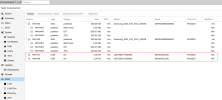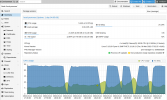Code:
proxmox-ve: 7.1-1 (running kernel: 5.13.19-5-pve)
pve-manager: 7.1-10 (running version: 7.1-10/6ddebafe)
pve-kernel-helper: 7.1-12
pve-kernel-5.13: 7.1-8
pve-kernel-5.13.19-5-pve: 5.13.19-13
pve-kernel-5.13.19-4-pve: 5.13.19-9
pve-kernel-5.13.19-2-pve: 5.13.19-4
ceph-fuse: 15.2.15-pve1
corosync: 3.1.5-pve2
criu: 3.15-1+pve-1
glusterfs-client: 9.2-1
ifupdown2: 3.1.0-1+pmx3
ksm-control-daemon: 1.4-1
libjs-extjs: 7.0.0-1
libknet1: 1.22-pve2
libproxmox-acme-perl: 1.4.1
libproxmox-backup-qemu0: 1.2.0-1
libpve-access-control: 7.1-6
libpve-apiclient-perl: 3.2-1
libpve-common-perl: 7.1-3
libpve-guest-common-perl: 4.1-1
libpve-http-server-perl: 4.1-1
libpve-storage-perl: 7.1-1
libspice-server1: 0.14.3-2.1
lvm2: 2.03.11-2.1
lxc-pve: 4.0.11-1
lxcfs: 4.0.11-pve1
novnc-pve: 1.3.0-2
proxmox-backup-client: 2.1.5-1
proxmox-backup-file-restore: 2.1.5-1
proxmox-mini-journalreader: 1.3-1
proxmox-widget-toolkit: 3.4-6
pve-cluster: 7.1-3
pve-container: 4.1-4
pve-docs: 7.1-2
pve-edk2-firmware: 3.20210831-2
pve-firewall: 4.2-5
pve-firmware: 3.3-5
pve-ha-manager: 3.3-3
pve-i18n: 2.6-2
pve-qemu-kvm: 6.1.1-2
pve-xtermjs: 4.16.0-1
qemu-server: 7.1-4
smartmontools: 7.2-1
spiceterm: 3.2-2
swtpm: 0.7.0~rc1+2
vncterm: 1.7-1
zfsutils-linux: 2.1.2-pve1
Code:
Disk /dev/sdd: 931.51 GiB, 1000204886016 bytes, 1953525168 sectors
Disk model: 100T2B0A-00SM50
Units: sectors of 1 * 512 = 512 bytes
Sector size (logical/physical): 512 bytes / 4096 bytes
I/O size (minimum/optimal): 4096 bytes / 4096 bytes
Disklabel type: gpt
Disk identifier: A81159BE-A4A0-6747-ACA9-080E2A240690
Disk /dev/sdc: 931.51 GiB, 1000204886016 bytes, 1953525168 sectors
Disk model: 100T2B0A-00SM50
Units: sectors of 1 * 512 = 512 bytes
Sector size (logical/physical): 512 bytes / 4096 bytes
I/O size (minimum/optimal): 4096 bytes / 4096 bytes
Disklabel type: gpt
Disk identifier: 509CE6DB-165A-6442-B928-664CD205A5EF
Note the serial number.
Code:
ls -l /dev/disk/by-id
total 0
lrwxrwxrwx 1 root root 9 Mar 10 14:50 ata-Samsung_SSD_870_EVO_250GB_S6PENJ0RB40583V -> ../../sdb
lrwxrwxrwx 1 root root 10 Mar 10 14:50 ata-Samsung_SSD_870_EVO_250GB_S6PENJ0RB40583V-part1 -> ../../sdb1
lrwxrwxrwx 1 root root 10 Mar 10 14:50 ata-Samsung_SSD_870_EVO_250GB_S6PENJ0RB40583V-part2 -> ../../sdb2
lrwxrwxrwx 1 root root 10 Mar 10 14:50 ata-Samsung_SSD_870_EVO_250GB_S6PENJ0RB40583V-part3 -> ../../sdb3
lrwxrwxrwx 1 root root 9 Mar 10 14:50 ata-Samsung_SSD_870_EVO_250GB_S6PENJ0RB40585D -> ../../sda
lrwxrwxrwx 1 root root 10 Mar 10 14:50 ata-Samsung_SSD_870_EVO_250GB_S6PENJ0RB40585D-part1 -> ../../sda1
lrwxrwxrwx 1 root root 10 Mar 10 14:50 ata-Samsung_SSD_870_EVO_250GB_S6PENJ0RB40585D-part2 -> ../../sda2
lrwxrwxrwx 1 root root 10 Mar 10 14:50 ata-Samsung_SSD_870_EVO_250GB_S6PENJ0RB40585D-part3 -> ../../sda3
lrwxrwxrwx 1 root root 11 Mar 10 14:50 lvm-pv-uuid-PsS2aq-dT3d-NP8t-Guiu-y0n0-TVva-EGjWJ1 -> ../../zd0p5
lrwxrwxrwx 1 root root 9 Mar 10 19:06 usb-WDC_WDS_100T2B0A-00SM50_98765432100C-0:0 -> ../../sdc
lrwxrwxrwx 1 root root 9 Mar 10 14:50 wwn-0x5002538f31b23c5d -> ../../sdb
lrwxrwxrwx 1 root root 10 Mar 10 14:50 wwn-0x5002538f31b23c5d-part1 -> ../../sdb1
lrwxrwxrwx 1 root root 10 Mar 10 14:50 wwn-0x5002538f31b23c5d-part2 -> ../../sdb2
lrwxrwxrwx 1 root root 10 Mar 10 14:50 wwn-0x5002538f31b23c5d-part3 -> ../../sdb3
lrwxrwxrwx 1 root root 9 Mar 10 14:50 wwn-0x5002538f31b23c5f -> ../../sda
lrwxrwxrwx 1 root root 10 Mar 10 14:50 wwn-0x5002538f31b23c5f-part1 -> ../../sda1
lrwxrwxrwx 1 root root 10 Mar 10 14:50 wwn-0x5002538f31b23c5f-part2 -> ../../sda2
lrwxrwxrwx 1 root root 10 Mar 10 14:50 wwn-0x5002538f31b23c5f-part3 -> ../../sda3Note again that only sdc is listed in the ID (no sdd). Proxmox is installed in ZFS raid1 on sda and sdb. I want to create a new pool for the data. Since I can't create a by-id I have to create a by-path.
Code:
ls -l /dev/disk/by-path
total 0
lrwxrwxrwx 1 root root 9 Mar 10 14:50 pci-0000:00:12.0-ata-1 -> ../../sda
lrwxrwxrwx 1 root root 9 Mar 10 14:50 pci-0000:00:12.0-ata-1.0 -> ../../sda
lrwxrwxrwx 1 root root 10 Mar 10 14:50 pci-0000:00:12.0-ata-1.0-part1 -> ../../sda1
lrwxrwxrwx 1 root root 10 Mar 10 14:50 pci-0000:00:12.0-ata-1.0-part2 -> ../../sda2
lrwxrwxrwx 1 root root 10 Mar 10 14:50 pci-0000:00:12.0-ata-1.0-part3 -> ../../sda3
lrwxrwxrwx 1 root root 10 Mar 10 14:50 pci-0000:00:12.0-ata-1-part1 -> ../../sda1
lrwxrwxrwx 1 root root 10 Mar 10 14:50 pci-0000:00:12.0-ata-1-part2 -> ../../sda2
lrwxrwxrwx 1 root root 10 Mar 10 14:50 pci-0000:00:12.0-ata-1-part3 -> ../../sda3
lrwxrwxrwx 1 root root 9 Mar 10 14:50 pci-0000:00:12.0-ata-2 -> ../../sdb
lrwxrwxrwx 1 root root 9 Mar 10 14:50 pci-0000:00:12.0-ata-2.0 -> ../../sdb
lrwxrwxrwx 1 root root 10 Mar 10 14:50 pci-0000:00:12.0-ata-2.0-part1 -> ../../sdb1
lrwxrwxrwx 1 root root 10 Mar 10 14:50 pci-0000:00:12.0-ata-2.0-part2 -> ../../sdb2
lrwxrwxrwx 1 root root 10 Mar 10 14:50 pci-0000:00:12.0-ata-2.0-part3 -> ../../sdb3
lrwxrwxrwx 1 root root 10 Mar 10 14:50 pci-0000:00:12.0-ata-2-part1 -> ../../sdb1
lrwxrwxrwx 1 root root 10 Mar 10 14:50 pci-0000:00:12.0-ata-2-part2 -> ../../sdb2
lrwxrwxrwx 1 root root 10 Mar 10 14:50 pci-0000:00:12.0-ata-2-part3 -> ../../sdb3
lrwxrwxrwx 1 root root 9 Mar 11 11:02 pci-0000:00:15.0-usb-0:1:1.0-scsi-0:0:0:0 -> ../../sdc
lrwxrwxrwx 1 root root 9 Mar 10 14:56 pci-0000:00:15.0-usb-0:2:1.0-scsi-0:0:0:0 -> ../../sddI'll create a zpool now
Code:
zpool create datapool mirror pci-0000:00:15.0-usb-0:1:1.0-scsi-0:0:0:0 pci-0000:00:15.0-usb-0:2:1.0-scsi-0:0:0:0
Code:
zpool status
pool: datapool
state: ONLINE
config:
NAME STATE READ WRITE CKSUM
datapool ONLINE 0 0 0
mirror-0 ONLINE 0 0 0
pci-0000:00:15.0-usb-0:1:1.0-scsi-0:0:0:0 ONLINE 0 0 0
pci-0000:00:15.0-usb-0:2:1.0-scsi-0:0:0:0 ONLINE 0 0 0
errors: No known data errors
pool: rpool
state: ONLINE
config:
NAME STATE READ WRITE CKSUM
rpool ONLINE 0 0 0
mirror-0 ONLINE 0 0 0
ata-Samsung_SSD_870_EVO_250GB_S6PENJ0RB40585D-part3 ONLINE 0 0 0
ata-Samsung_SSD_870_EVO_250GB_S6PENJ0RB40583V-part3 ONLINE 0 0 0
errors: No known data errors
In the Proxmox GUI, I want to look at disks, but the operation fails and the disks do not appear.
If I put in the fdisk -l shell, the operation will not complete. When I destroy the pool, the IO delay is still high. When I physically disconnect the SSD, the IO delay stabilizes.
I still have two other SSDs, so I tried to replace these disks, but the result was repeated. I suspect this adapter. It always shows the same SN (98765432100C) for different discs. I contacted axagon and got the answer that their device is fine and I have to solve the problem with OS support.
Last edited:

